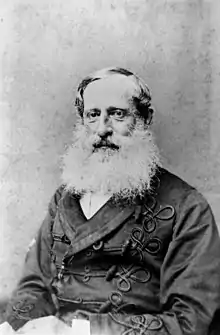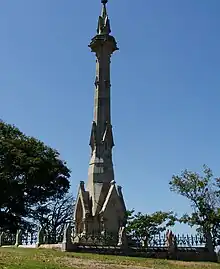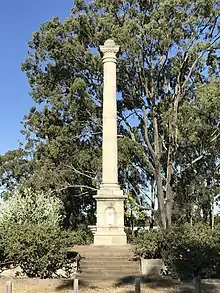Samuel Blackall | |
|---|---|
 | |
| 2nd Governor of Queensland | |
| In office 14 August 1868 – 2 January 1871 | |
| Monarch | Queen Victoria |
| Preceded by | Sir George Bowen |
| Succeeded by | George Phipps, 2nd Marquess of Normanby |
| Personal details | |
| Born | 1 May 1809 Dublin, Ireland, United Kingdom of Great Britain and Ireland |
| Died | 2 January 1871 (aged 61) Brisbane, Queensland |
| Resting place | Toowong Cemetery, Queensland |
| Nationality | Irish |
| Spouse(s) | Georgiana Rowles (1833–1853) Catherine Bond (1858–1864) |
| Profession | Politician |
Samuel Wensley Blackall (1 May 1809 – 2 January 1871) was an Irish soldier and politician, who was the second Governor of Queensland from 1868 until he died in office in 1871.[1][2]
Early life
Blackall was born in Dublin, Ireland into a prosperous Irish family and attended Trinity College, Dublin at the age of 15, but did not graduate.[3] In 1827 he joined the 85th (Bucks Volunteers) Regiment of Foot, as an ensign and was appointed a lieutenant in 1832. He sold his commission in 1833 after five years service and joined the Royal Longford Militia, as a major.[4]
Public life
He entered Irish public life in 1833, becoming High Sheriff of Longford for 1833 and, several years later, high sheriff of County Tyrone for 1862.[4][5] In between those appointments, he spent four years as an MP in the British House of Commons for the constituency of Longford.


.jpg.webp)
From 1851 to 1857, he worked in the colonial service as Lieutenant-Governor of Dominica. After some trouble with the Colonial Office, he returned to colonial service as governor of Sierra Leone, then governor in chief at the West African Settlements from 1865, and then Governor of Queensland from 1868. Blackall's tenure as governor was dominated by a constitutional crisis caused by a deadlock in the Legislative Assembly of Queensland.
Death and legacy
By 1870, Blackall's health was declining rapidly, and shortly after selecting the highest burial site at the new Toowong Cemetery, he died in office on 2 January 1871.
The town of Blackall in Queensland was named after him, as was the Blackall Range and Blackall Terrace in East Brisbane and the merchant ship SS Governor Blackall.[4]
References
- ↑ Note: Blackall was not the same Samuel Blackall who was linked with Jane Austen as a potential suitor. The latter was a Fellow of Emmanuel College, Cambridge, of whom Jane commented in letters to her sister Cassandra, 'There is less love and more sense in it than sometimes appeared before, and I am very satisfied. It will all go on exceedingly well and decline away in a very reasonable manner". See: Marghanita Laski (1977) Jane Austen and her world, Thames and Hudson London. p. 46
- ↑ Morrison, A. A. (1969). "Blackall, Samuel Wensley (1809–1871)". Australian Dictionary of Biography. Vol. 3. National Centre of Biography, Australian National University. pp. 172–173. ISSN 1833-7538.
- ↑ "Alumni Dublinenses : a register of the students, graduates, professors and provosts of Trinity College in the University of Dublin (1593–1860)" George Dames Burtchaell/Thomas Ulick Sadleir p69: Dublin, Alex Thom and Co, 1935
- 1 2 3 Roberts, Beryl (1991). Stories of the Southside. Archerfield, Queensland: Aussie Books. p. 114. ISBN 0-947336-01-X.
- ↑ "High Sheriffs, 1862". The Cavan Observer. 18 January 1862. Retrieved 9 July 2009.
External links
- Mennell, Philip (1892). . The Dictionary of Australasian Biography. London: Hutchinson & Co – via Wikisource.
- Blackall, Samuel Wensley — Brisbane City Council Grave Location Search
- Hansard 1803–2005: contributions in Parliament by Samuel Blackall
